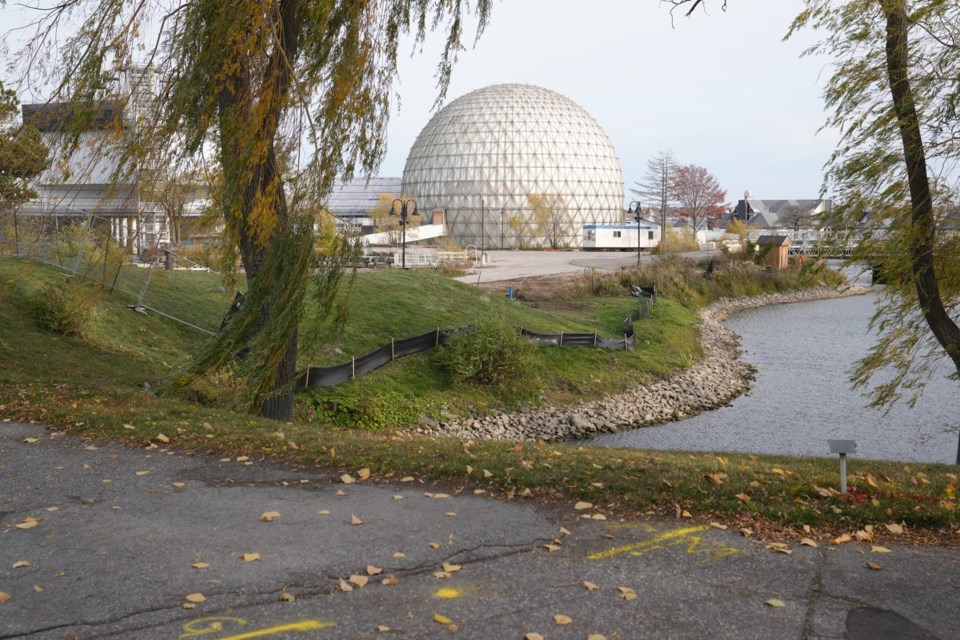TORONTO — The Ontario government has released the terms of its 95-year lease with European company Therme for the spa and waterpark it plans to build at Ontario Place, and it shows the province has promised 1,600 parking spaces for the private facility on Toronto's waterfront.
The spa and waterpark have been the subject of vocal criticism, particularly for the fact that the province is on the hook for building the parking area, and opponents have long called on the government to release the details of the lease.
An auditor general report last year suggested Ontario's obligations to provide parking for Therme factored in to its decision to relocate the Ontario Science Centre from east Toronto to the redeveloped Ontario Place attraction.
The report said a government proposal on relocating the science centre suggested parking could be integrated with the building at Ontario Place "in order to dispel public/stakeholder concerns relating to cost and impact on the environment."
The lease shows Ontario has promised 1,600 dedicated parking spaces for Therme, and the government says it is proposing a total of 2,500 parking spaces for Ontario Place. Some of Therme's parking spaces are set to be shared with Live Nation during concerts.
It also shows that if the government doesn't meet its parking obligations, it will have to pay Therme $5 per parking space per day once the facility is open.
However, Infrastructure Ontario president and CEO Michael Lindsay noted in a media briefing about the lease that it stipulates the spots can be up to 650 metres away from the facility, so there are other surface lots in the area that could be used temporarily.
"The parking is required, not only for Live Nation and Therme, but also the people who are going to come to the Ontario Science Centre and the people who are going to use the enhanced public park space down at Ontario Place," Lindsay said.
"So the government of Ontario has always been thinking about how, with six million annual visitors likely to come year over year to Ontario Place, what parking will be required."
Premier Doug Ford has agreed in a deal with the City of Toronto to consider moving the parking to nearby Exhibition Place, rather than in a garage under the new Ontario Science Centre.
No final decisions have yet been made on the parking location, Lindsay said.
Ontario is not paying for any of Therme's capital costs, he said, nor giving it any subsidies.
Still, as part of the Ontario Place redevelopment, which will include a concert venue, the science centre, parkland, trails and a deep-water swimming pier, the government has so far spent "hundreds of millions" on site servicing, Lindsay said.
That includes cutting down trees, which Lindsay said has started now that it is October because birds and bats are no longer in their nesting season.
"All trees are replaced at a two-to-one ratio, and mature trees are going to be replaced at a six-to-one ratio," Lindsay said. "The net effect of all this is 1,300 additional trees."
After answering the question about tree removals, the moderator of the technical briefing cut in to say officials would be taking no more questions on trees.
Ontario NDP leader Marit Stiles suggests there is more to the tree situation than what is being made public.
"I think that the government, whatever they don't answer, you better believe there's a reason, because they know how deeply unpopular it is to remove those trees from that site," she said.
Therme is spending about $200 million to create 16 acres of new, public parkland space, the government said. The facility itself is expected to cost $500 million to build.
As part of the briefing, officials touted the benefits of Therme's project, including $294 million toward Ontario's GDP, 2,000 jobs during the construction phase and $84 million in revenue to the province from Therme for rent and maintenance payments from 2034 to 2044.
Ontario has the right to terminate the lease early — with five years' notice — after the Therme facility has been in operation for 10 years.
This report by The Canadian Press was first published Oct. 3, 2024.
Allison Jones, The Canadian Press



